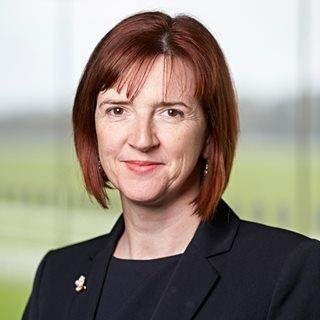Dr Gillian Rudduck PhD MCOptom DipTp(IP) Higher Cert Glauc

Dr Gillian Rudduck PhD MCOptom DipTp(IP) Higher Cert Glauc

My role
“I’m full-time and deliver six to seven clinical sessions per week in the hospital. I do on average three days a week in clinic, but the timetable is flexible which gives me time to do other things. It’s not a 9-5 job, but you could have more set hours, if you had parental or caring responsibilities for example.
In my clinics we do: biometry, electrodiagnostics, glaucoma, cataracts, diabetes, AMD and emergency eye care. My area of specialty is paediatric eye care, which is related to the PhD I did, and I also deliver the glaucoma and macular clinics.
I line manage eight optometrists and also a team of 16 audiologists as a result of a successful Turnaround project I did with that department. I am the manager, but they also have a clinical lead. I report to the clinical director for surgical division.”
Career progression
“I worked in community practice for two years then I did a PhD and was also employed as a clinical demonstrator at the university where I studied.
I locumed in independent practice which helped me to understand the role of the optometrist at the sharp end of practice – it’s helpful to work in a range of areas so you understand the roles more fully.
I did tutoring work in low vision which helped me to develop a relationship with the local hospital and that really whetted my appetite for HES, then I did some hospital practice and low vision work.
I was a sole optometrist at a hospital for a while and although this was a lot of responsibility and I did have to make clinical decisions on my own it did give me free rein to develop the service. I did this for five years before moving to my current job 19 years ago. This role has evolved significantly over that time.”
Changes in the profession
“There’s been lots of change in our job roles, we didn’t deliver these kinds of services at the beginning. We have an increasingly ageing population and a decrease in NHS investment so we must supply services and extended roles in collaboration with other non-medical healthcare professionals like nurses and orthoptists.
The Foresight Report is essential reading for optometrists, as it outlines the possible changes and challenges in our profession. My advice to others is to get out of your comfort zone, and ask others, don’t be afraid.”
What I enjoy
“What I enjoy most about my job is really feeling I’m making a difference. Every day is a challenge and I love seeing my team develop; people are new to the hospital optometry role and then they grow.
I would say networking is really important, see what others are doing. There is peer support in hospital optometry, it’s a small close-knit community and they are free with their support. Hospital optometry is pushing on an open door in ophthalmology, these are exciting opportunities.”
My role
“I’m full-time and deliver six to seven clinical sessions per week in the hospital. I do on average three days a week in clinic, but the timetable is flexible which gives me time to do other things. It’s not a 9-5 job, but you could have more set hours, if you had parental or caring responsibilities for example.
In my clinics we do: biometry, electrodiagnostics, glaucoma, cataracts, diabetes, AMD and emergency eye care. My area of specialty is paediatric eye care, which is related to the PhD I did, and I also deliver the glaucoma and macular clinics.
I line manage eight optometrists and also a team of 16 audiologists as a result of a successful Turnaround project I did with that department. I am the manager, but they also have a clinical lead. I report to the clinical director for surgical division.”
Career progression
“I worked in community practice for two years then I did a PhD and was also employed as a clinical demonstrator at the university where I studied.
I locumed in independent practice which helped me to understand the role of the optometrist at the sharp end of practice – it’s helpful to work in a range of areas so you understand the roles more fully.
I did tutoring work in low vision which helped me to develop a relationship with the local hospital and that really whetted my appetite for HES, then I did some hospital practice and low vision work.
I was a sole optometrist at a hospital for a while and although this was a lot of responsibility and I did have to make clinical decisions on my own it did give me free rein to develop the service. I did this for five years before moving to my current job 19 years ago. This role has evolved significantly over that time.”
Changes in the profession
“There’s been lots of change in our job roles, we didn’t deliver these kinds of services at the beginning. We have an increasingly ageing population and a decrease in NHS investment so we must supply services and extended roles in collaboration with other non-medical healthcare professionals like nurses and orthoptists.
The Foresight Report is essential reading for optometrists, as it outlines the possible changes and challenges in our profession. My advice to others is to get out of your comfort zone, and ask others, don’t be afraid.”
What I enjoy
“What I enjoy most about my job is really feeling I’m making a difference. Every day is a challenge and I love seeing my team develop; people are new to the hospital optometry role and then they grow.
I would say networking is really important, see what others are doing. There is peer support in hospital optometry, it’s a small close-knit community and they are free with their support. Hospital optometry is pushing on an open door in ophthalmology, these are exciting opportunities.”